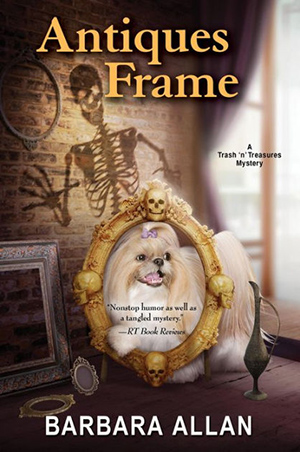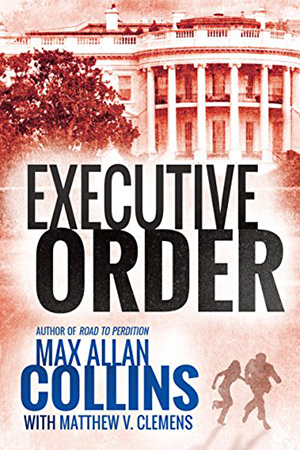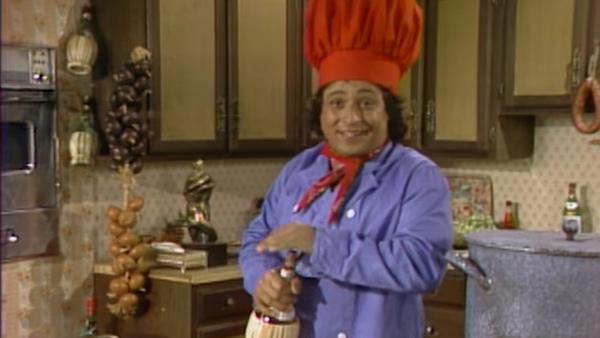This week Antiques Frame, the latest “Trash ‘n’ Treasures” mystery by Barb and me (writing as Barbara Allan), goes on sale. There’s also an audio book, which we’ve sampled but haven’t listened to all the way through, though the narrator this time is much more to our liking.
I realize that certain of my readers may not be inclined to pick up a “cozy” mystery, but some reviewers have realized that the series is in part a tongue-in-cheek send-up of that genre, and also that the novels have a certain edge, even if they aren’t Mike Hammer or Nate Heller or Quarry.
This particular novel has special meaning for me – not because it’s my favorite in the series (that might be Antiques Fate, just out in mass market paperback) but because it represented a real breakthrough for me. Antiques Frame was the first book I (co-)wrote after my open-heart surgery and the stroke I had, just for fun, on the operating table. As regular readers here may recall, I woke up in the hospital to a right arm and, to some degree, right side that were as useful as a broken hinge.
At the hospital I had both physical therapy and occupational therapy, and was helped by a number of terrific people in those disciplines. My right side came back within days – I was walking well and able to do the exercises asked of me, from riding stationery bikes to going up and down stairs. But my right hand remained feeble. The idea of typing with it again seemed abstract. The most disheartening thing was that I had lost my signature.
The doctors and therapists assured me I would get my right hand back, and the doctors especially implied the use would just back on its own. Not true. I had to work hard at it, with exercises ranging from rubber band contraptions to just flat out trying to write my name over and over again.
For a writer, the loss of his or her signature is a blow to the ego, to the very idea of identity. I was determined to get it back. But my biggest fear was losing the ability to type with both hands. Fortunately, almost immediately, I had some ability to use the hand – weak as hell, though. At home I soon found that a computer keyboard is sensitive enough that very faint pressure is all that’s required. My typing style is two-fisted, having trained on (and for a long time using) manual typewriters.
So my left hand was typically strong and my right weak as a kitten. This required backing off on my left. I began writing e-mails and this weekly blog. Very soon I was able to type passably well, and the first project I tackled – still spending time with physical and occupational therapy, for several weeks here at home before going to a facility – was my draft of Antiques Frame.
Again, if you’re a regular visitor here you may know how Barb and I operate on these books. We come up with a title and a basic plot, and sometimes plot the books together and sometimes our plotting session has been good enough that Barb can break down the chapters in an outline of sorts herself. She also does character lists and time lines. The book had been plotted, roughly, before my hospital stay.
She writes a rough draft, usually 200 to 250 pages. I then write my draft of 300 to 325 pages, mostly adding jokes and polishing, plus expanding dialogue. This time she wrote a good deal of her draft in my hospital room on a laptop. As the books are humorous mysteries, I’m not sure how she managed that.
When I began working on the book, I discovered that she had (not surprisingly) done a fine job, but (somewhat surprisingly) the humor quotient was typically high. In my diminished state, I hoped I could keep the thing funny, too. Frankly, I was hoping it would just be in English. But the effort went well, and working on a “Barbara Allan” was the perfect way for me to get back up on the writing horse and write/ride.
My right hand came back within a couple of months, pretty much strong as ever. And several more months later, when the galley proofs arrived of Antiques Frame, I swallowed hard and sat down to read them. I was amazed to find out the book was not only in English, but a solid and very funny entry in the series. It’s a reminder that writers live chiefly in their heads – their physical state is something they have to deal with, obviously, but as long as the mental engine is firing on all cylinders, the rest is incidental.
The other thing I learned is how good my wife has gotten at writing, and how generally wonderful a woman she is – actually, I already knew, but the experience of taking my pass on Antiques Frame was sweet confirmation.
* * *
Barb and I are preparing for our NYC trip for the Edgar awards and my receiving the Grand Master award. That’s on Thursday evening. For those of you in the New York area, here’s the line-up for the Wednesday Edgar-week symposium, which includes Charles Ardai of Hard Case Crime interviewing me.
Symposium Schedule
Cost: $95 members; $125 non-members – with a $15 retroactive discount for those who join MWA within 30 days after.
8:30 – 8:50: Registration
8:55 – 9:00: Welcome – MWA’s Executive Vice President – Donna Andrews
9:00 – 9:50: Meet the Class of 2017 – Best First Novel Nominees
Moderator: STEFANIE PINTOFF, 2010 Best First Edgar Winner (City on Edge, Bantam)
Panelists: Flynn Berry (2017 Best First Edgar Nominee – Under the Harrow, Penguin Books)
Bill Beverly (2017 Best First Edgar Nominee – Dodgers, Crown Publishing)
Joe Ide (2017 Best First Edgar Nominee – IQ, Little, Brown & Co – Mulholland Books)
Nick Petrie (2017 Best First Edgar Nominee – The Drifter – G.P. Putnam’s Sons)
Lili Wright (2017 Best First Edgar Nominee – Dancing with the Tiger – Marian Wood/Putnam)
Heather Young (2017 Best First Edgar Nominee – The Lost Girls – William Morrow)
10:00 – 10:50: From the Writer’s Desk, Part 1
Grand Master Max Allan Collins interviewed by Charles Ardai
11:00 – 11:50: Just the Facts – If you’re not writing what you know, you’re writing what you want to know – and today’s savvy reader will send you a note if you get it wrong, How do writers of fiction and nonfiction crime approach research? When do they know they’ve researched enough?
Moderator: LAURIE R. KING, MWA NorCal Chapter President (Murder of Mary Russell – Bantam)
Panelists: Ruth Franklin (2017 Best Critical/Bio Nominee – Shirley Jackson – W.W. Norton)
Laurence Leamer (2017 Best Fact Crime Nominee – The Lynching – William Morrow)
Kate Summerscale (2017 Best Fact Crime Nominee – The Wicked Boy – Penguin Press)
Caroline (Charles) Todd (2017 MHC Award Nominee – The Shattered Tree – William Morrow)
James Ziskin (2017 Best PBO Nominee – Heart of Stone – Seventh Street Books)
11:50 – 1:00 Lunch Break (On Your Own)
1:00 – 1:50: Nursery Noir – Writers of mysteries for young readers may have the toughest audience of all. How do dark stories translate for the teen and tween set? How do adult writers get into the minds – and hearts – of kid readers?
Moderator: LORI RADER-DAY, MWA Midwest Chapter President (The Day I Died – William Morrow)
Panelists: Brent Hartinger (2017 Best Young Adult Nominee – Three Truths and a Lie – Simon Pulse)
April Henry (2017 Best Young Adult Nominee – The Girl I Used to Be – Christy Ottaviano Books)
Sarah Lariviere (2017 Best Juvenile Nominee – The Bad Kid – Simon & Schuster BFYR)
James Ponti (2017 Best Juvenile Nominee – Framed! – Aladdin)
Billy Taylor (2017 Best Young Adult Nominee – Thieving Weasels – Penguin YR – Dial Books)
Susan Vaught (2017 Best Juvenile Nominee – Things Too Huge to Fix by Saying Sorry – Paula Wiseman Books)
2:00 – 2:50 Liars Club – Liars, cheats, thieves, murderers – and, sometimes, those are the protagonists. How do writers create characters that keep readers up at night? How do they create empathy in characters who make bad guys look pretty good?
Moderator: JEFFERY DEAVER, 2017 MWA President (The Burial Hour – Grand Central Publishing)
Panelists: Laura Benedict (2017 Best Short Story Nominee – “A Paler Shade of Death” – St. Louis Noir)
Alafair Burke (2017 Best Novel Nominee – The Ex – HarperCollins)
Robert Dugoni (2017 Best PBO Nominee – The 7th Canon – Thomas & Mercer)
Lyndsay Faye (2017 Best Novel Nominee – Jane Steele – G.P. Putnam’s Sons)
Alison Gaylin (2017 Best Novel Nominee – What Remains of Me – William Morrow)
Martha Hillier (2017 Best TV Episode Nominee – “Dark Road” – Vera)
3:00 – 3:50: #AuthorLife – There’s no one way to be a crime writer. Agent/no agent. Small press/big five. Plotter/pantser forever. How did these authors get into the life of crime – and what advice do they have for aspiring writers taking a stab at mystery?
Moderator: MARK STEVENS, MWA Rocky Mtn Chapter President (Lake of Fire – Midnight Ink)
Panelists: Megan Abbott (2017 Best Short Story Nominee – “Oxford Girl” – Mississippi Noir)
Patricia Abbott (2017 Best PBO Nominee – Shot in Detroit – Polis Books)
Reed Farrel Coleman (2017 Best Novel Nominee – Where it Hurts – G.P. Putnam’s Sons)
Tyler Dilts (2017 Best PBO Nominee – Come Twilight – Thomas & Mercer)
Adrian McKinty (2017 Best PBO Nominee – Rain Dogs – Seventh Street Books)
Wendy Corsi Staub (2017 MHC Award Nominee – Blue Moon – William Morrow)
4:00 – 4:50: From the Writer’s Desk, Part 2
Grand Master Ellen Hart – Interviewed by Oline Cogdill
* * *
All the books have been mailed out on our “free books” offer. Just about everyone who requested one got one.
The newly published Executive Order has received some nice notices, like this one.
And another one here.
This article includes me as a mystery writer doing some TV scripting.
Finally, and I kid you not (as Jack Paar used to say), here’s a review of the 1985 trade paperback, The Files of Ms. Tree Vol. 1.
M.A.C.










